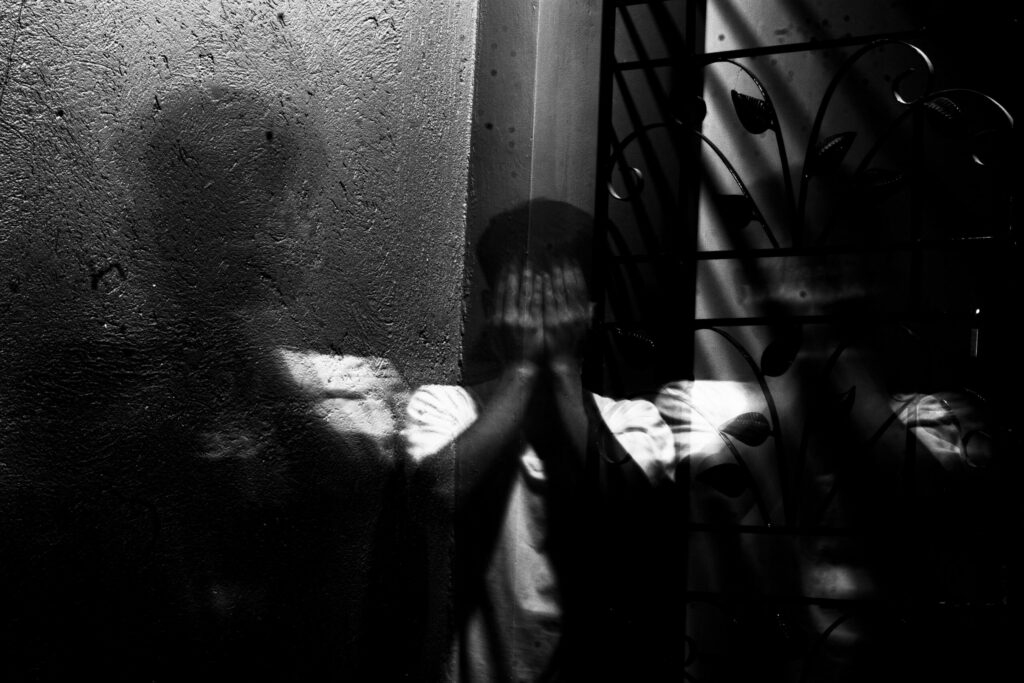We’ve all been there. Odds are, if you’ve been on dating apps in the last ten years, you’ve been ghosted at least once.
You match with someone on HER, or you meet some hot lesbian at the local dog park, and there seems to be a vibe. You go on a date, and things go great. Maybe you even hook up or share a kiss.
After exchanging messages back and forth for a while, you wake up one morning to find that you never hear from this person again. Then, it hits you: I think I just got ghosted. Again.
But why do people ghost on dating apps? Do the ghosters feel bad about it afterward? Why does it hurt so much to be ghosted? How can you get over it?
Here is everything you need to know about ghosting, including how to tell if you are getting ghosted and how to cope with being permanently left on read.
What is the definition of ‘ghosting’?
What does it mean if someone is ghosting you? Ghosting is when someone abruptly stops communicating with someone as a means to end a romantic relationship to connection. Ghosting is basically another word for disappearing without a trace.
While a fair share of ghosting happens when dating, it can also happen to queer people when friends, colleagues, or family members suddenly drop off the map without explanation.
Ghosting has existed since the dawn of time, but the term has taken on a new meaning with the rise of modern dating apps and social media. Before texting, people used to be able to get away with not showing up for a date or never calling again. However, electronic communication has added new levels of transparency and accountability to how we communicate with each other.
It can be painful when someone suddenly disappears from your life without reason, especially if you haven’t done anything wrong. It’s easy to make up stories in your head about what you did or why they’ve suddenly given you an Irish goodbye. But as someone who has been both a ghoster and a ghostee, it’s not always what you think it is.
Here are the top ghosting signs to look out for and how to respond when someone gives you back nothing in return.
Identifying Ghosting Signs
If you are straight-up ghosted, it’s pretty easy to identify. You will know when it happens to you. However, a new breed of ghosting has taken over modern dating called “the soft ghost.”
Soft ghosting is more of a gradual fade or a slow exit from a relationship rather than an abrupt disappearance. It can be hard to work out whether or not someone is just busy or bad at texting or whether you are being soft ghosted. Here are some signs to look out for.
- They keep canceling plans you’ve made or bailing on dates.
- They are vague about their availability and when you might see each other again.
- There are long lapses frequently in your communication. You respond instantly, while they might take hours or days to get back to you.
- They often “react” to your messages with a heart or a like to end the conversation.
- Your conversations don’t go very deep or for very long.
- They don’t seem as interested in you as you are in them.
Source: Twitter
There is a difference between someone who is bad at communicating and someone who is ghosting you. Sometimes we feel like someone is ignoring us when really they are just working, hanging with friends, or caught up in something that day.
The main thing to look out for when trying to figure out if you’re being ghosted or soft ghosted is the following pattern: a repeated lack of consistency, clarity, and communication.
Reasons why people ghost
Although technology makes it easy to connect with others, it can also be an easy way to cut people off. If you’ve ever been ghosted, you will know how awful it feels to have somebody just suddenly stop replying to your messages. So why do people do it? It’s not always what you think it is.
You may never know for sure exactly why you were ghosted, but it’s common for people with avoidant tendencies to use ghosting as an exit strategy out of a relationship. It would be great if everyone could communicate and be honest, but this isn’t easy for everyone.
Being honest is an uncomfortable practice that requires emotional strength. It’s much easier to simply vanish than to be upfront about how you feel.
Those who struggle with confrontation might find it difficult to hold space for another person’s feelings or deal with the consequences of their actions without going back on their word. These people tend to find ghosting or running away easier than dealing with the difficult stuff in life.
Some people might also ghost because they are going through a particularly busy or challenging time in their life or their romantic circumstances have changed. It’s also common for people to simply drop off chatting on dating apps if they might be experiencing the decision fatigue that comes from dating burnout.
It’s worth noting that some people ghost because they, too, fear rejection and would rather be the one to cut it off than the one who gets hurt. While this may seem emotionally immature, sometimes ghosting is the only way some people know how to deal with this fear.
If you find yourself starting to ghost someone, do them a favor, send them a message, and just let them know that you’re not interested anymore. While you might be afraid to disappoint them, being honest and forthright will show that you respect them and their time, even if things don’t work out between the two of you.
The impact of ghosting
Getting ghosted never feels good. It can bring up deep feelings of rejection and insecurity. You might be overanalyzing your behaviors, looking over old text messages, and asking yourself what happened. It is painful and confusing to be left guessing what you did or didn’t do to cause the other person to leave things so unfinished.
For queer and trans people, the damage can hit twice as hard. We are already working through the societal shame of homophobia and transphobia that many of us experienced early in life. This can leave us particularly vulnerable to fears of rejection in our adult relationships.
Adam D. Blum, a gay licensed clinical psychologist, says that ghosting “can touch on that unconscious, vulnerable part of ourselves that still believes that LGBTQ people are unlovable.”
How to respond if you’ve been ghosted
The truth is that ghosting says more about the person who ghosts than it does about you. Successful relationships are always based on good communication between people. If this is something that they struggle with, then they might not be the person for you.
If you think that you are being ghosted, the best thing you can do is stop pursuing them. Put your energy and love back into yourself and the people in your life who treat you with respect. Take yourself out on a date, cook yourself a nice dinner, buy yourself a new journal—any act of self-care that can connect you back to yourself.
If you want to tell them how they have made you feel, you can always send a simple, direct text asking for clarity. How the person responds will tell you everything that you need to know about whether or not they deserve a second chance.
Keep your head up, protect your energy, and keep the ghosts at bay!







